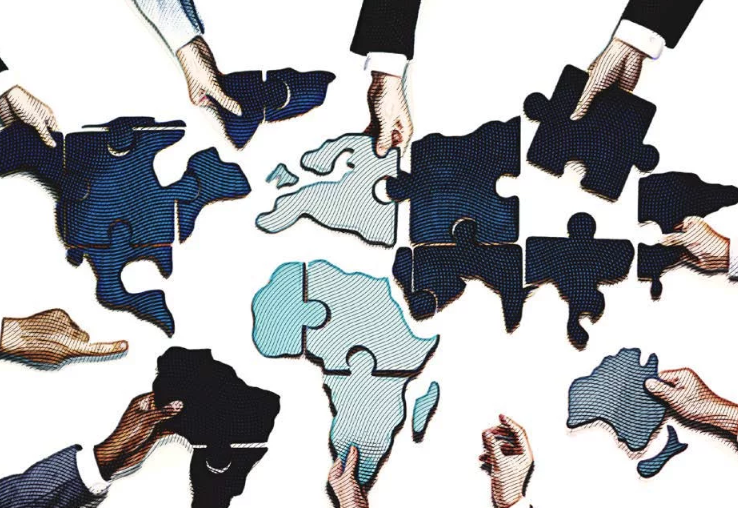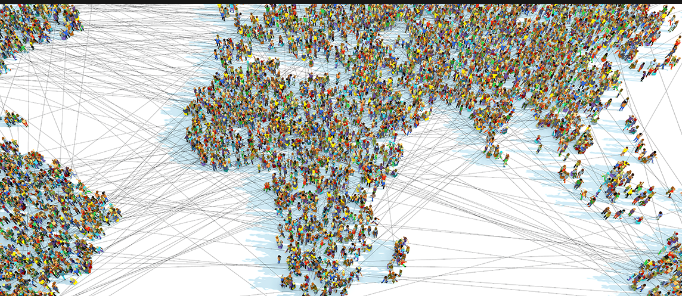What is Multilateralism?
Multilateralism, a term often defined as “the practice of coordinating national policies in groups of three or more states” (Keohane, 1990: 731), stands as a beacon of global cooperation. However, it transcends mere cooperation, encapsulating a structured framework that binds sovereign nations through agreed-upon principles, norms, and codes of conduct. These multilateral institutions provide a stage for dialogue, alleviating uncertainties, guiding activities, and facilitating negotiations and consensus-building (Keohane 1990; Ruggie, 1992).

Principles Encompassing Multilateralism
Indivisibility of Interest: United Pursuits
Multilateralism’s core principle, indivisibility of interest, underscores the equality of members within such institutions. A collective security system, for instance, interprets an attack on one nation as aggression against all, underscoring the interconnectedness of global concerns.
Diffuse Reciprocity: A Cycle of Mutual Advantage
Embedded in multilateralism is the concept of diffuse reciprocity. It paints a picture where participants mutually gain from the collaborative arrangement. Each contribution made ultimately benefits all, cultivating a cycle of mutual gains.
Generalized Principles of Conduct: Guiding Interactions
Multilateralism thrives on generalized principles of conduct, shaping the norms and regulations that govern interactions between nations. These principles serve as guiding lights, fostering harmonious coexistence and cooperation.
Dispute Settlement: Pathways to Resolution
Multilateral institutions incorporate mechanisms for dispute settlement, ensuring the resolution of disagreements and adherence to established rules. These mechanisms foster stability and cooperation among member states.

Impact and Influence of Multilateral Institutions
Safeguards of Stability and Influence
Multilateral institutions, encompassing entities like the United Nations (UN), the North Atlantic Treaty Organization (NATO), and the European Union (EU), stand as pillars of stability and influence in the global arena. Comprising sovereign states and established through treaties, these institutions serve as vehicles for collective action and collaboration.
The UN charter, a prime example, outlines the fundamental tenets of international cooperation, with a primary focus on upholding global peace and security. Meanwhile, the United Nations Framework Convention on Climate Change (UNFCCC) addresses the critical challenge of climate change on an international level.
Critiquing Multilateralism: Challenges and Responses
The Essence of Multilateralism
At the heart of international relations lies the concept of multilateralism—a practice that involves coordinating policies among three or more sovereign states. This intricate mechanism isn’t just confined to theoretical discussions; it forms the foundation of global cooperation, fostering coordination and collaboration on a multitude of issues.
Defining Multilateralism: Beyond Coordination
Multilateralism isn’t merely about states coming together for the sake of coordination. It involves the establishment of institutions that lay down shared principles, norms, and rules of conduct. These institutions provide a platform for dialogue, negotiation, and compromise. In essence, multilateralism acts as a safeguard against uncertainty and unilateralism, promoting a more inclusive and balanced international order.
Principles Underpinning Multilateralism
Several key principles define the essence of multilateralism, shaping its dynamics and outcomes:
- Indivisibility of Interest: The principle of equality prevails within multilateral institutions. States are seen as equals, and their interests are intertwined. An attack on one is perceived as an attack on all, as exemplified in collective security systems.
- Diffuse Reciprocity: The beauty of multilateralism lies in its ability to benefit all participating members over time. While immediate gains might differ, every member stands to gain from sustained collaboration.
- Generalized Principles of Conduct: Multilateralism is built on shared norms and rules that guide interactions between states. These norms promote cooperation, peaceful coexistence, and adherence to established standards.
- Dispute Settlement: Mechanisms for resolving disputes and ensuring compliance are embedded within multilateral institutions. These mechanisms ensure that conflicts are resolved through peaceful means and that states uphold their commitments.
Multilateral Institutions: Pillars of Global Governance
Multilateralism finds its tangible form in institutions like the United Nations (UN), the North Atlantic Treaty Organization (NATO), and the European Union (EU). These intergovernmental organizations are established by treaties, bringing sovereign states together to address multifaceted challenges.
The UN charter, for instance, outlines principles that foster international cooperation, aiming to maintain global peace and security. Similarly, the United Nations Framework Convention on Climate Change (UNFCCC) stands as a testament to multilateral efforts in addressing the urgent issue of climate change.
Addressing Criticisms and Adaptation
Despite its significance, multilateralism isn’t immune to criticism. Detractors often point to its complexity, asserting that decision-making can become convoluted and sluggish. However, these criticisms haven’t diminished its relevance. In fact, they have spurred adaptive measures to enhance its effectiveness.
Embracing Multilateralism for Global Crises

Multilateralism and Global Crises
In the face of pressing global challenges, multilateralism stands as a guiding principle that brings nations together to navigate intricate issues. As the world grapples with crises that transcend borders and affect humanity as a whole, the power of multilateral cooperation shines even brighter.
The Call of the Climate Crisis: A United Response
Amid the urgent calls of the climate crisis, the importance of multilateral cooperation becomes resoundingly clear. Climate change knows no boundaries; it affects every corner of the globe, endangering ecosystems, communities, and economies. In the battle against rising temperatures, multilateralism becomes not just an option, but an imperative.
Beyond National Borders: The Reach of Multilateralism
Multilateralism offers a unique vantage point—a way to transcend national interests and confront challenges that impact us all. The climate crisis serves as a stark reminder that our fates are interconnected, and isolated actions are inadequate in the face of a planet-wide emergency. The need for collective action has never been more evident.
A Multilateral Coalition: States and Beyond
The power of multilateralism doesn’t stop at states; it extends to a diverse range of stakeholders. Civil society, cities, businesses, and grassroots movements all play a pivotal role in driving multilateral efforts. Their involvement transforms multilateralism from a diplomatic concept into a tangible force for change.
Cities Leading the Way: Local Multilateralism
Cities, often at the forefront of climate impacts, have stepped up as catalysts for multilateral change. Through networks like the C40 Cities Climate Leadership Group, urban centers worldwide collaborate to share strategies, innovations, and best practices. These actions resonate far beyond city limits, influencing national and global policies.
Non-State Actors: Building Momentum
The engagement of non-state actors, from NGOs to businesses, amplifies the impact of multilateralism. They bring diverse perspectives, innovation, and resources to the table. Initiatives like the We Mean Business coalition demonstrate how businesses can drive climate action, proving that multilateralism is everyone’s responsibility.
Ambitious Climate Action: A Multilateral Imperative
As the clock ticks and the effects of climate change intensify, the need for ambitious climate action grows urgent. Multilateral cooperation is the bedrock upon which such action can be built. By fostering collaboration, sharing knowledge, and pooling resources, multilateralism equips us to face the climate challenge head-on.
The Role of Multilateralism in Conflict Resolution
Promoting Peace Through Multilateral Channels
Multilateralism isn’t limited to environmental or economic spheres; it extends to conflict resolution. Organizations like the United Nations have played pivotal roles in mediating disputes and fostering diplomatic solutions, showcasing the broader applicability of multilateral principles.
Economic Multilateralism: Navigating Trade and Finance

Economic Multilateralism and Prosperity
Amid the intricate web of global trade and finance, economic multilateralism emerges as a key framework that holds the promise of fostering prosperity and equitable growth for nations across the world. In an era characterized by interdependence and economic interconnectivity, the role of economic multilateralism takes center stage.
The Role of Trade: A Global Engine for Prosperity
At the heart of economic multilateralism lies the concept of trade— the exchange of goods and services between nations. This exchange isn’t just about products; it’s a conduit for sharing ideas, cultures, and innovation. By facilitating trade negotiations and agreements, economic multilateralism unlocks opportunities for countries to capitalize on their strengths while addressing their shortcomings.
Navigating the World Trade Organization (WTO)
One of the most prominent players in the realm of economic multilateralism is the World Trade Organization (WTO). Established in 1995, the WTO serves as a platform for member countries to negotiate trade deals, resolve disputes, and set international trade rules. Through its multilateral trade agreements, the WTO ensures that trade is conducted fairly, transparently, and with mutual benefits.
Promoting Fair Trade Practices: The WTO’s Role
Fair trade practices lie at the core of economic multilateralism, and the WTO plays a pivotal role in upholding them. By creating a level playing field for all nations, regardless of their economic stature, the WTO mitigates the risk of unfair trade practices. This inclusivity fosters an environment where nations can engage in trade without the fear of being disadvantaged.
Equitable Growth: Beyond Economic Prosperity
Economic multilateralism goes beyond mere prosperity; it aspires for equitable growth. This growth is rooted in the idea that economic benefits should be accessible to all segments of society, ensuring that the fruits of globalization aren’t concentrated in the hands of a few. Through policies that prioritize inclusivity, economic multilateralism strives to uplift economies and societies worldwide.
A Shared Path Forward: Multilateral Financial Institutions
In addition to trade, multilateral financial institutions also play a vital role in economic multilateralism. Organizations like the International Monetary Fund (IMF) and the World Bank provide financial assistance, policy advice, and technical support to nations in need. By pooling resources and expertise, these institutions bolster economic stability and development on a global scale.
Navigating Challenges: Adaptation and Collaboration
While economic multilateralism offers a promising path, it’s not without challenges. Differing national interests, protectionism, and evolving economic landscapes can complicate negotiations. However, these challenges also underscore the need for collaborative solutions that address the concerns of all parties involved.




